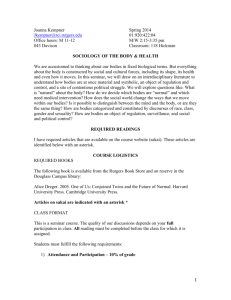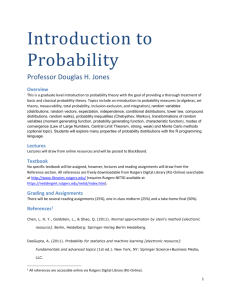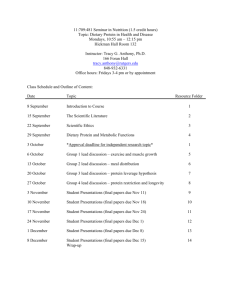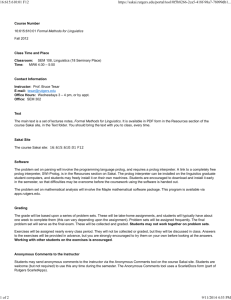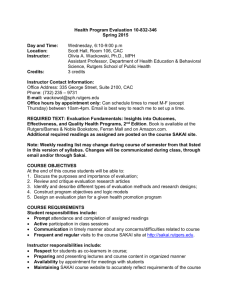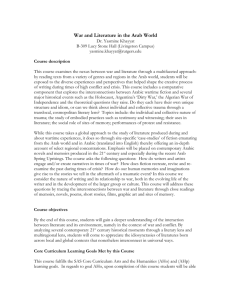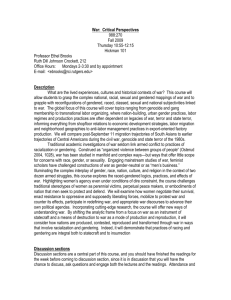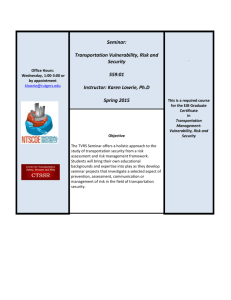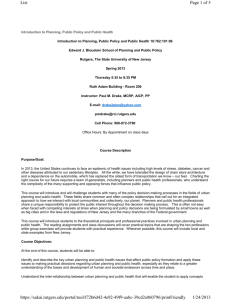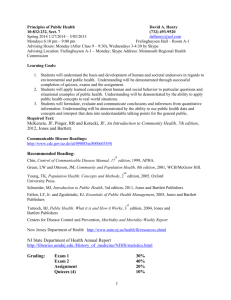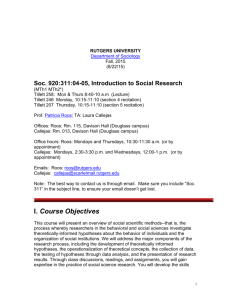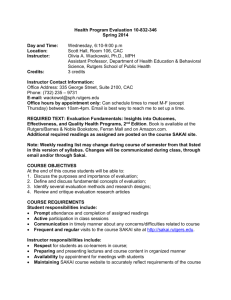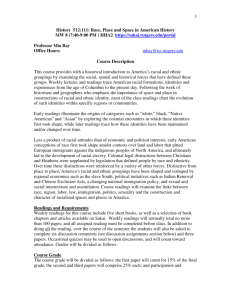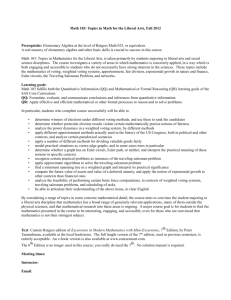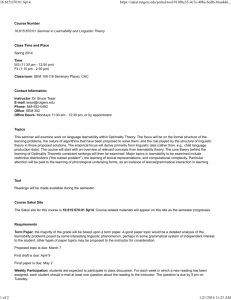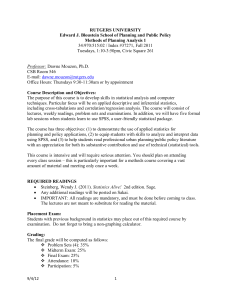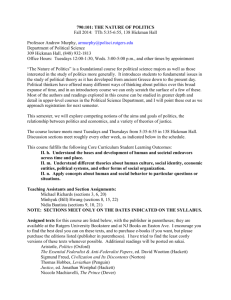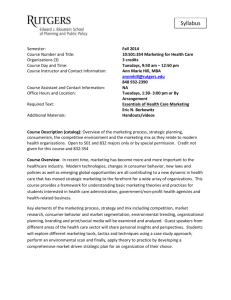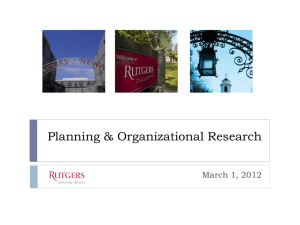620-FA11-Felder-20110908-144057
advertisement
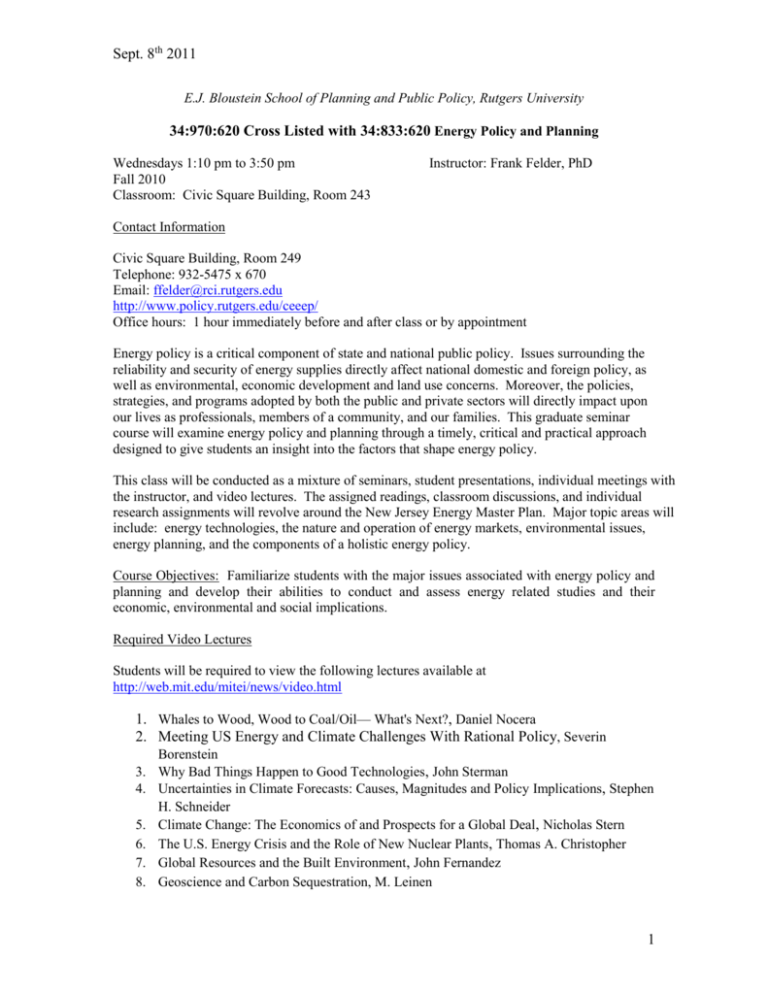
Sept. 8th 2011 E.J. Bloustein School of Planning and Public Policy, Rutgers University 34:970:620 Cross Listed with 34:833:620 Energy Policy and Planning Wednesdays 1:10 pm to 3:50 pm Fall 2010 Classroom: Civic Square Building, Room 243 Instructor: Frank Felder, PhD Contact Information Civic Square Building, Room 249 Telephone: 932-5475 x 670 Email: ffelder@rci.rutgers.edu http://www.policy.rutgers.edu/ceeep/ Office hours: 1 hour immediately before and after class or by appointment Energy policy is a critical component of state and national public policy. Issues surrounding the reliability and security of energy supplies directly affect national domestic and foreign policy, as well as environmental, economic development and land use concerns. Moreover, the policies, strategies, and programs adopted by both the public and private sectors will directly impact upon our lives as professionals, members of a community, and our families. This graduate seminar course will examine energy policy and planning through a timely, critical and practical approach designed to give students an insight into the factors that shape energy policy. This class will be conducted as a mixture of seminars, student presentations, individual meetings with the instructor, and video lectures. The assigned readings, classroom discussions, and individual research assignments will revolve around the New Jersey Energy Master Plan. Major topic areas will include: energy technologies, the nature and operation of energy markets, environmental issues, energy planning, and the components of a holistic energy policy. Course Objectives: Familiarize students with the major issues associated with energy policy and planning and develop their abilities to conduct and assess energy related studies and their economic, environmental and social implications. Required Video Lectures Students will be required to view the following lectures available at http://web.mit.edu/mitei/news/video.html 1. Whales to Wood, Wood to Coal/Oil— What's Next?, Daniel Nocera 2. Meeting US Energy and Climate Challenges With Rational Policy, Severin Borenstein 3. Why Bad Things Happen to Good Technologies, John Sterman 4. Uncertainties in Climate Forecasts: Causes, Magnitudes and Policy Implications, Stephen H. Schneider 5. Climate Change: The Economics of and Prospects for a Global Deal, Nicholas Stern 6. The U.S. Energy Crisis and the Role of New Nuclear Plants, Thomas A. Christopher 7. Global Resources and the Built Environment, John Fernandez 8. Geoscience and Carbon Sequestration, M. Leinen 1 Sept. 8th 2011 Students will be required to submit a two page memo summarizing and critiquing each video lecture. Students may submit their memos at anytime during the semester. Required and Recommended Readings Required and recommended readings are either available on the internet or on the course’s Sakai website https://sakai.rutgers.edu/portal Academic Integrity All members of our community must be confident that each person's work has been responsibly and honorably acquired, developed, and presented. Any effort to gain advantage not given to all students is dishonest, whether or not the effort is successful. A violation of academic honesty is a breach of trust, and will result in penalties, including possible suspension or expulsion. When in doubt about plagiarism, paraphrasing, quoting, or collaboration, consult the course instructors. Please see: http://academicintegrity.rutgers.edu/students.shtml for further information. Schedule of Classes and Assignments September 7 Class overview and introduction to energy policy and planning September 14 Energy Trends, Technologies and Implications Read the Executive Summary of EIA’s 2011 Annual Energy Outlook: http://www.eia.gov/oiaf/aeo/index.html Read the 2008 NJ Energy Master Plan http://www.nj.gov/emp/docs/pdf/081022_emp.pdf September 21 NJ Energy Master Plan Read the 2011 Draft NJ Energy Master Plan http://www.nj.gov/emp/docs/pdf/2011%20Draft%20Energy%20M aster%20Plan.pdf September 28 Student presentations (1-15 minute informal presentation on a state or major city’s energy plan but NOT NJ) What problems is the plan trying to address? What are the major components of the plan? What is your assessment of whether the plan will succeed or not and why? October 5 Energy Analysis: Tools in the Toolkit Read the NJ Energy Modeling Report prepared by CEEEP for the 2008 Energy Master Plan 2 Sept. 8th 2011 http://www.state.nj.us/emp/docs/pdf/10122208ceeepModEMP.pdf October 12 Student presentations (topics to be provided) October 19 Climate Change John Holdren, Meeting the Climate Change Challenge, available on Sakai IPCC Technical Summary 2007, available on Sakai October 26 Energy efficiency and renewable resources CEEEP: A Review of CT’s Renewable Portfolio Standard http://policy.rutgers.edu/ceeep/publications/2011/CTRPSReview72 02011.pdf November 2 Oil, coal, nuclear and natural gas Readings to be provided at a later date November 9 NO CLASS November 16 Energy markets Readings to be provided at a later date November 21 Monday Student presentations (topics to be provided) November 23 NO CLASS November 30 Student negotiations on the NJ Energy Master Plan December 7 Student negotiations on the NJ Energy Master Plan December 14 Final Paper due (more details provided during the semester) Grading 25% in class presentations, 25% video memorandums, 25% energy master plan negotiations, 25% final paper on the NJ Energy Master Plan 3


